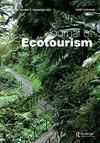Four ecotourism archetypes: expressing symbolic desires
IF 2.4
Q2 HOSPITALITY, LEISURE, SPORT & TOURISM
引用次数: 0
Abstract
ABSTRACT Most ecotourism research focuses on logical, expressed desires, while deeper meanings (or symbolic desires), are less well understood, perhaps because elicitation is difficult. Consequently, prior research is relatively limited on the deeper motivations driving ecotourism behaviour. To address that lack, an ethnographic study of nature-based tourism activities in Malaysia and a symbolic interactionist approach is taken to unpack hedonic meaning-making. The data gave rise to four ecotourist archetypes: The champion, the adherent, the acolyte, and the spa-goer, for ecotourists seeking trial, spiritual, learning and purification benefits, respectively. The study provides both greater insight into how to use ethnographic research to elicit symbolic desires in ecotourism, and practitioner support for the design and delivery of more fulfilling nature-based tourism experiences. The archetypes can be viewed as a symbolic benefits-based market segmentation schema, forming the basis for developing more effective targeting, positioning, branding and value propositions for nature-based tourism activities.四种生态旅游原型:表达象征性欲望
本文章由计算机程序翻译,如有差异,请以英文原文为准。
求助全文
约1分钟内获得全文
求助全文
来源期刊

Journal of Ecotourism
Social Sciences-Geography, Planning and Development
CiteScore
6.40
自引率
12.50%
发文量
32
期刊介绍:
The Journal of Ecotourism seeks to advance the field by examining the social, economic, and ecological aspects of ecotourism at a number of scales, and including regions from around the world. Journal of Ecotourism welcomes conceptual, theoretical, and empirical research, particularly where it contributes to the dissemination of new ideas and models of ecotourism planning, development, management, and good practice. While the focus of the journal rests on a type of tourism based principally on natural history - along with other associated features of the man-land nexus - it will consider papers which investigate ecotourism as part of a broader nature based tourism, as well as those works which compare or contrast ecotourism/ists with other forms of tourism/ists.
 求助内容:
求助内容: 应助结果提醒方式:
应助结果提醒方式:


